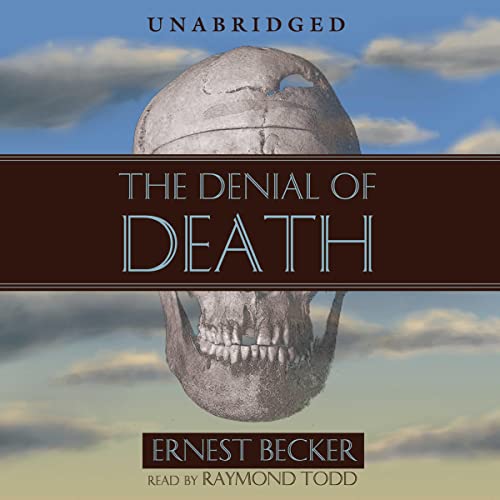Ernest Becker’s “The Denial of Death” audiobook delves into human mortality and our quest for meaning. It explores how we cope with the fear of death.
“The Denial of Death” by Ernest Becker is a profound exploration of human psychology. Becker argues that much of human behavior stems from an inherent fear of death. This fear drives us to seek meaning and value in life. The audiobook meticulously examines how cultural beliefs and personal achievements serve as mechanisms to deny our mortality.
Becker’s insights challenge listeners to confront their existential anxieties. This thought-provoking work is essential for those interested in psychology, philosophy, and understanding the human condition. Engage with this audiobook to gain a deeper perspective on life’s ultimate questions.

Introduction To Ernest Becker And ‘the Denial Of Death’
Ernest Becker was a cultural anthropologist. He won the Pulitzer Prize in 1974. His works focus on human behavior and psychology. Becker’s most famous book is “The Denial of Death”. He was born in 1924 and died in 1974. Becker studied at Syracuse University. He also taught at various universities. His ideas influence many fields today.
“The Denial of Death” explores human fear of mortality. Becker argues that this fear drives many actions. The book combines psychology, philosophy, and anthropology. It suggests that people create cultural beliefs to cope. Becker believes these beliefs help manage existential anxiety. The book remains influential in psychology and beyond.

Core Concepts Of ‘the Denial Of Death’
Ernest Becker explains that humans use heroism to fight their fear of death. People seek to be heroes in their own lives. This gives them a sense of purpose. By doing great things, they feel immortal. Heroism can be small acts or big deeds. It helps people feel important. This way, the fear of death becomes less scary. Heroism is a shield against the fear of dying.
Culture plays a big role in how people deal with death. Traditions and rituals help people feel better about dying. Beliefs and stories make them feel like death is not the end. Culture gives people ways to remember loved ones. This makes death less frightening. Each culture has its own ways to handle death. Cultural practices help people live without fear of dying.
Psychological Insights From The Book
Freud’s theories greatly shaped Becker’s work. Becker explored how unconscious fears drive our actions. Freud believed our childhood experiences impact adult behavior. Becker took this idea further. He said that fear of death influences us deeply. This fear often hides in our unconscious mind. It shapes our culture and personal choices. Understanding Freud helps grasp Becker’s ideas better.
Anxiety plays a huge role in our lives. Becker said that fear of death causes much of our anxiety. This fear makes us seek meaning and purpose. We join groups and follow leaders to feel safe. Anxiety pushes us to achieve and create. It also causes conflict and stress. Knowing this can help us understand human behavior better.
Philosophical Underpinnings
Existentialism is a key theme in Becker’s work. He believed in exploring the human condition. Becker’s ideas challenge us to face our mortality. The fear of death shapes human behavior. This fear drives us to create meaning in life. Existentialism questions the purpose of existence. It forces us to confront our fears. Becker’s theories connect deeply with existentialist thought.
Kierkegaard deeply influenced Becker. Kierkegaard spoke about anxiety and dread. These emotions arise from our awareness of death. Becker built on these ideas. He explored how humans cope with this awareness. Kierkegaard’s writings were a foundation for Becker’s theories. Both philosophers focus on the individual’s struggle. They seek to understand the human soul in the face of death.
Becker’s Critique Of Modern Society
Modern society promotes the idea of individuality. People believe they are unique and special. Becker argues this belief is an illusion. It hides the truth about our mortality. People create personal identities to feel important. This distracts them from the fear of death. Society encourages self-focus to keep people occupied. Becker thinks this is a defense mechanism. It helps people cope with their existential anxiety.
Culture plays a big role in denying death. Rituals and traditions keep people busy. They distract from thoughts of mortality. Becker says culture creates symbols of eternal life. These symbols give people a sense of continuity. Religion is a major part of this process. It offers promises of an afterlife. Art and literature also help in this denial. They give people a sense of immortality through creativity.
Implications For Psychotherapy
Ernest Becker’s ideas can help in therapy. His work suggests confronting death fears. This can make therapy more effective. Clients might feel more alive and engaged. Therapists can use this to reduce anxiety.
Talking about death can be hard. But it can also be healing. Clients may find peace when they face their fears. This can lead to personal growth and better mental health. It can help them live a fuller life.
Reception And Criticisms Of The Book
The book received much attention from scholars. Many appreciated its bold ideas. Some called it a game-changer in psychology. It even won the Pulitzer Prize in 1974. Cultural critics also found it fascinating. Its influence spread to many fields. Literature and film often reference its themes. The book became a cornerstone for existential psychology.
Some critics say the book is too gloomy. They feel it focuses too much on death. Others argue it lacks scientific evidence. Some believe Becker’s ideas are too abstract. Yet, many defend the book strongly. They argue that death is a crucial topic. Supporters believe it tackles difficult truths. They say it challenges us to face our fears.
Legacy And Continuing Relevance
Ernest Becker’s work has shaped modern psychology. Many thinkers use his ideas. His book, “The Denial of Death,” is still popular. Psychologists and philosophers reference it often. It helps us understand human behavior. People fear death, Becker says. This fear drives many actions. His ideas influence therapy methods today. His work also impacts cultural studies. Many writers draw from his theories. Becker’s legacy lives on in many fields.
People today still deal with the fear of death. Becker’s ideas help explain this fear. Modern society has many distractions. These distractions hide our fear of death. His work helps us see these distractions. Self-help books often use his theories. Many people find comfort in his ideas. Becker’s work is also important in education. Schools use his book to teach psychology. His ideas help students understand human nature. This makes his work very relevant today.

Conclusion
The “Ernest Becker – The Denial of Death Audiobook” offers profound insights into human behavior. This audiobook is a must-listen for anyone exploring existential psychology. It provides valuable perspectives on mortality and life’s meaning. Dive into this transformative experience and enrich your understanding of human nature.



